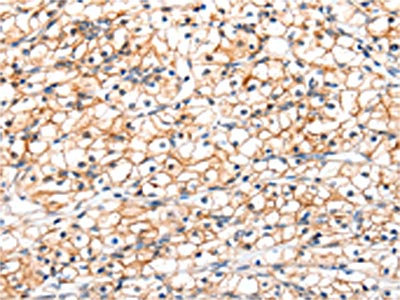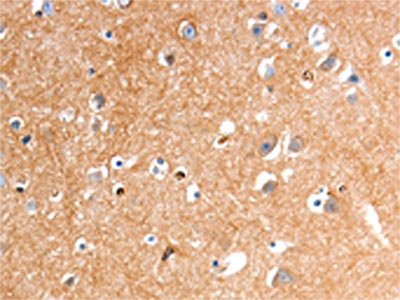GLP1R Antibody
-
货号:CSB-PA183226
-
规格:¥1100
-
图片:
-
The image on the left is immunohistochemistry of paraffin-embedded Human renal cancer tissue using CSB-PA183226(GLP1R Antibody) at dilution 1/20, on the right is treated with fusion protein. (Original magnification: ×200)
-
The image on the left is immunohistochemistry of paraffin-embedded Human brain tissue using CSB-PA183226(GLP1R Antibody) at dilution 1/20, on the right is treated with fusion protein. (Original magnification: ×200)
-
-
其他:
产品详情
-
Uniprot No.:P43220
-
基因名:
-
别名:GLP1R; Glucagon-like peptide 1 receptor; GLP-1 receptor; GLP-1-R; GLP-1R
-
宿主:Rabbit
-
反应种属:Human,Mouse,Rat
-
免疫原:Fusion protein of Human GLP1R
-
免疫原种属:Homo sapiens (Human)
-
标记方式:Non-conjugated
-
抗体亚型:IgG
-
纯化方式:Antigen affinity purification
-
浓度:It differs from different batches. Please contact us to confirm it.
-
保存缓冲液:-20°C, pH7.4 PBS, 0.05% NaN3, 40% Glycerol
-
产品提供形式:Liquid
-
应用范围:ELISA,IHC
-
推荐稀释比:
Application Recommended Dilution ELISA 1:2000-1:5000 IHC 1:25-1:100 -
Protocols:
-
储存条件:Upon receipt, store at -20°C or -80°C. Avoid repeated freeze.
-
货期:Basically, we can dispatch the products out in 1-3 working days after receiving your orders. Delivery time maybe differs from different purchasing way or location, please kindly consult your local distributors for specific delivery time.
相关产品
靶点详情
-
功能:G-protein coupled receptor for glucagon-like peptide 1 (GLP-1). Ligand binding triggers activation of a signaling cascade that leads to the activation of adenylyl cyclase and increased intracellular cAMP levels. Plays a role in regulating insulin secretion in response to GLP-1.
-
基因功能参考文献:
- review studies that have focused on GLP-1 and the spinal cord, and summarize the expression of GLP-1R and the innervation of PPG neurons in the spinal cord, as well as the potential therapeutic benefits of GLP-1R activation. PMID: 29329976
- The study provides evidence that the insulinotropic action of zfGIP in mammalian systems involves activation of both the GLP-1 and the GIP receptors but not the glucagon receptor PMID: 29157578
- Clinical studies in non-diabetic patients with neurodegenerative disorders showed neuroprotective effects following administration with GLP-1 receptor agonists, demonstrating that neuroprotective effects are independent of blood glucose levels. PMID: 29412810
- Some GLP-1 receptor agonist (GLP-1RA) have been approved for the treatment of type 2 diabetes mellitus(T2DM) and although clinical trials may not have been designed to investigate bone fracture, first results suggest that GLP-1RA may not exacerbate abnormal bone quality observed in T2DM PMID: 29412811
- Here, we discuss recent findings concerning the signalling and trafficking of the GLP-1R in pancreatic beta cells. Leveraging "bias" at the receptor towards cAMP generation versus the recruitment of beta-arrestins and extracellular signal-regulated kinases (ERK1/2) activation may allow the development of new analogues with significantly improved clinical efficacy. PMID: 29412835
- This may represent a potential mechanism for GLP-1R agonist-induced cardioprotection in type 2 diabetes , as increases in fatty acid oxidation and decreases in glucose oxidation are frequently observed in the hearts of animals and human subjects with T2D. PMID: 29412838
- In type 2 diabetic patients from a Han Chinese population, some variations in the GLP-1R gene were associated with a lower risk of developing coronary artery disease. PMID: 30271789
- Activation of endogenous GLP-1 is associated with sepsis in patients with type 2 diabetes. PMID: 29334697
- increased GLP-1R innervation in IBD bowel could mediate enhanced visceral afferent signalling, and provide a peripheral target for therapeutic intervention PMID: 29813107
- GLP1R mRNA transcripts, encompassing the entire open reading frame, were detected in all four cardiac chambers from 15 hearts at levels approximating those detected in human pancreas. PMID: 29444223
- Low active GLP-1 secretion is associated with hypertriglyceridaemia. PMID: 29135069
- this study, we investigated whether glucagon and glucagon-like peptide-1 (GLP-1), hormones produced by alpha cells, contribute to insulin secretion in INS-1 cells, a beta cell line. Co-treatment with glucagon and exendin-4 (Ex-4), a GLP-1 receptor agonist, additively increased glucose-stimulated insulin secretion in INS-1 cells PMID: 29725251
- genetic association studies in population in Republic of Korea: Data suggest that SNPs in PAX4 and GLP1R are associated with type 2 diabetes (T2D) in the population studied. In genome-wide associations, PAX4 Arg192His increased risk of T2D; GLP1R Arg131Gln decreased risk of T2D. (PAX4 = paired box 4 protein; GLP1R = glucagon-like peptide 1 receptor) PMID: 29941447
- LINC01121 functions as a tumor promoter by means of its involvement in the process of translational repression of the GLP1R and inhibition of the cAMP/PKA signaling pathway. PMID: 29843149
- cryo-EM structure of the human GLP-1 receptor in complex with the G protein-biased peptide exendin-P5 and a Galphas heterotrimer, determined at a global resolution of 3.3 A PMID: 29466332
- The results demonstrate the exendin-4 induces a partial reduction in triglycerides in steatotic hepatocytes within 12 h via the GLP-1 receptor-mediated activation of protein kinase A. Thus, the reduction in hepatocyte triglyceride accumulation is likely driven primarily by downregulation of lipogenesis and upregulation of beta-oxidation of free fatty acids PMID: 28707223
- Data (including data from studies in knockout mice) suggest that MIR204 (which is highly enriched in beta-cells) directly targets 3'-untranslated region of GLP1R and thereby down-regulates expression of GLP1R in beta-cells. Studies were also conducted in primary human and mouse beta-cells and in rat insulinoma cell line. PMID: 29101219
- Data suggest that GLP1R signaling in pancreatic beta-cells leading to insulin secretion involves interactions of GLP1R with HIP1, SNX1, and SNX27; HIP1 appears to regulate coupling of cell surface GLP1R activation with endocytosis; SNX1 and SNX27 appear to control balance between GLP1R plasma membrane recycling and lysosomal degradation. PMID: 29284659
- The GLP-1R was abundantly expressed in numerous regions, including the septal nucleus, hypothalamus, and brain stem. PMID: 29095968
- This is the first time that human Epicardial adipose tissue is found to express both GLP-1R and GLP-2R genes. PMID: 28514806
- Changes in GLP-1 levels are associated with weight loss in newly diagnosed Chinese diabetes patients receiving acarbose PMID: 27717194
- the present study revealed that overexpression of GLP1R significantly reduces proliferation, migration and cytokine release in ASM cells from COPD patients; this involved a significant increase in ABCA1 expression levels. This provided evidence to suggest that GLP1R may be a potential therapeutic target for the treatment of COPD. PMID: 28560433
- IL-33, GLP-1R, and CCL20 are deregulated in human inflammatory bowel disease. GLP-1 receptor agonists upregulate IL-33, mucin 5b, and CCL20 in murine Brunner's glands. GLP-1 receptor agonists affect gut homeostasis in both proximal and distal parts of the gut. PMID: 27542128
- Data show that exendin-4 (Ex-4) could attenuate breast cancer cell proliferation via activation of glucagonlike peptide-1 (GLP-1) receptor (GLP-1R) and subsequent inhibition of nuclear factor kappaB (NF-kappaB ) activation. PMID: 29045658
- crystal structure of the full-length GLP-1 receptor bound to a truncated peptide agonist PMID: 28562585
- crystal structures of the human GLP-1R transmembrane domain in complex with two different negative allosteric modulators, PF-06372222 and NNC0640, at 2.7 and 3.0 A resolution, respectively PMID: 28514449
- Data suggest that pancreatic level of GLP1R is highest in insulin-secreting cells; here, highest intensity of GLP1R immunostaining was observed in beta-cells in pancreatic tissues obtained from organ-donor cadavers with type 2 diabetes. PMID: 28094469
- Data show that purified glucagon-like peptide-1 (GLP-1) receptor (GLP1R)GLP1R in nanodiscs that could bind to GLP-1 and exendin-4 and activate Gs protein. PMID: 28609478
- Dapagliflozin, when added in real life to patients with T2DM treated with GLP1-R agonists, induced a further significant, albeit modest improvement in A1C and a further weight loss. PMID: 28077257
- analysis of the biological binding site of exendin-4 peptide in the N-terminal domain of the intact human glucagon-like peptide-1 receptor PMID: 28283573
- GLP1-R may represent a novel target for treating bronchial hyperresponsiveness. PMID: 27447052
- Our studies show that GLP-1R is widely expressed throughout the human hypothalamus. The decreased expression of GLP-1R in the PVN and IFN of T2DM patients may be related to the dysregulation of feeding behavior and glucose homeostasis in type 2 diabetes mellitus. PMID: 26672638
- In conclusion, exenatide significantly improves coronary endothelial function in patients with newly diagnosed type 2 diabetes. The effect may be mediated through activation of AMPK/PI3K-Akt/eNOS pathway via a GLP-1R/cAMP-dependent mechanism. PMID: 27072494
- A higher likelihood of attaining A1c goal levels were observed when a GLP-1R agonists was initiated. PMID: 28230449
- Immunohistochemistry of human ileum tissues was performed in this study, which showed that TAS2R38 was co-localized with glucagon-like peptide 1 (GLP-1) in enteroendocrine L-cells. PMID: 27208775
- Data suggest that three conserved positively charged residues located at extracellular ends of transmembrane helices 3, 4 and 5 of GLP1R are essential for high affinity agonist binding and conformational transitions linked to pleiotropic effector coupling through stabilisation of extracellular domains. PMID: 27569426
- The rate of homologous desensitization and internalization of the GLP-1R has been determined in a transgenic cell line system. PMID: 28035964
- In glucagon-like peptide receptor (GLP-1R) expressing cells, small molecule agonists induced cAMP production but caused no intracellular Ca2+ accumulation, ERK phosphorylation or hGLP-1R internalisation. PMID: 27100083
- We aimed to investigate whether genetic variations in glucagon-like peptide receptor are associated with responses to dipepdityl peptidase-4 inhibitors in patients with type 2 diabetes. Polymorphism in the GLP-1 receptor may influence DPP-4 inhibitor response. PMID: 27858848
- Results suggest that pancreatic ductal adenocarcinoma (PDAC) cells or their precursor lesions do not overexpress glucagon-like peptide-1 receptor (GLP-1R) compared with non-neoplastic pancreatic cells. PMID: 26495786
- The molecular dynamics simulations of wild-type and mutant GLP-1R.ligand complexes provided molecular insights into GLP-1R-specific recognition mechanisms for the N terminus of GLP-1 by residues in the 7TM pocket and explained how glucagon-mimicking GLP-1 mutants restored binding affinity for (glucagon receptor -mimicking) GLP-1R mutants. PMID: 27059958
- NMR-determined structure of a high-potency cyclic conformationally-constrained 11-residue analogue of GLP-1 was also docked into the receptor-binding site. PMID: 26598711
- Lack of association of rs6923761 GLP-1 R polymorphism with weight loss. PMID: 26015316
- An association was found between the rs6923761 GLP-1 receptor polymorphism and basal GLP-1 levels in diabetes mellitus type 2 patients. PMID: 25200998
- although GLP-1R is not an independent prognostic factor in PDAC patients, it appears to have some implications for pancreatic ductal adenocarcinoma metastatic ability PMID: 26238361
- Retinal GLP1R expression was similar in patients with diabetes and healthy controls. PMID: 26384381
- reduced level in renal arteries of hypertensive patients PMID: 25915883
- these findings demonstrate the hGLP-1R has distinct regions within the C-terminal domain required for its cell surface expression, activity and agonist-induced internalisation. PMID: 26116235
- GLP-1R rs10305420 polymorphism explained some of the inter-individual differences in response to liraglutide regarding weight loss in obese PCOS women. PMID: 25991051
- 168Ser (rs6923761) was nominally associated with alcohol use disorder. The 168 Ser/Ser genotype was associated with increased alcohol administration, and with higher BOLD response in the right globus pallidus. PMID: 26080318
显示更多
收起更多
-
亚细胞定位:Cell membrane; Multi-pass membrane protein.
-
蛋白家族:G-protein coupled receptor 2 family
-
数据库链接:
HGNC: 4324
OMIM: 138032
KEGG: hsa:2740
STRING: 9606.ENSP00000362353
UniGene: Hs.351883
Most popular with customers
-
-
YWHAB Recombinant Monoclonal Antibody
Applications: ELISA, WB, IF, FC
Species Reactivity: Human, Mouse, Rat
-
Phospho-YAP1 (S127) Recombinant Monoclonal Antibody
Applications: ELISA, WB, IHC
Species Reactivity: Human
-
-
-
-
-






















